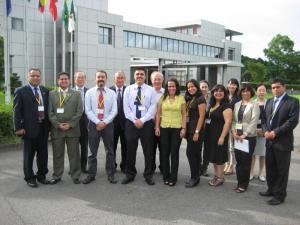Home > Workshop and Training > IN JAPAN > Fiscal Year 2011 > FY2011 JICA Training Course Starts on “Waste Management for Promoting Recycling-Oriented Societies in Central and South America(B)”
Main content starts here.
Update:September 1, 2011
FY2011 JICA Training Course Starts on “Waste Management for Promoting Recycling-Oriented Societies in Central and South America(B)”

On August 24 (Wed.), ICETT launched a JICA-commissioned training course on “Waste Management (B) for Promoting Recycling-Oriented Societies in Central and South America”. It is a one-and-a-half-month course, ending on October 5 (Wed.). Eight participants came from five countries: Chile, Colombia, Guatemala, Paraguay, and Venezuela.
1, Objectives and Background
Central and South American countries are afflicted with various problems arising from the excessive concentration of population in their capitals. Above all, domestic and industrial waste is becoming quite a serious pollution issue. This course is focused not only on the efficient waste disposal technologies in Japan but also on the shaping of recycling-oriented societies by promoting the 3Rs of Reduce, Reuse and Recycle, as well as environmental education. It also intends the participants to be learned Japanese knowhow and technologies to cope with Central and South American waste problems, the Japanese governmental support system to promote awareness of the environment, and how to promote this awareness at waste sources such as households and factories. In addition, the course includes approaches for the development and use of new energy sources in connection with waste disposal. This is expected to enhance the abilities of the government officials from the Central and South American countries to draw up and implement effective plans suited for the situation of these countries in order to contribute to the prevention of global warming.
2, Training Methods and Details
The course intends to promote the 3Rs in Central and South American countries, improve their local officials’ abilities to manage waste, and contribute to the formation of recycling-oriented societies and the prevention of global warming. In the training, the participants can compare the Japanese situation with that of their countries, learn about the characteristics and activities of the Japanese waste management administration, analyze conditions to create recycling-oriented societies and seek measures to remove the obstacles to do so. They will observe the activities of companies, local governments, and communities to learn about waste disposal, recycling methods, promoting environmental awareness, and the roles of governments, private businesses, and local communities. The goal is to draw up proposals on how a waste management system can be introduced in their own countries. To begin this process, the participants will present their inception reports, explain what problems their countries, communities, and workplaces face with regard to the theme of this course, clarify what they intend to learn about, and share information about the situation and problems in their countries with each other. The course consists of four modules.
Ⅰ) Japanese waste management system
In this module, the participants learn about the Japanese environmental policies on waste disposal, the Recycling Law, and the waste management systems introduced by the national and local governments to deepen their understanding of sorting, collecting, transporting, and incinerating household waste, as well as collection, transportation, and disposal of industrial waste. They also learn about laying out efficient collection and transportation routes to help set up effective systems in their countries.
Ⅱ) Methods to promote the 3Rs of Reduce, Reuse and Recycle to create recycling-oriented societies
Here, the participants learn about methods to promote the 3Rs and efforts made in Japan to practice the 3Rs Initiative. They also learn how to manage plastic, home appliance, and automobile scrapping under the Recycling Law, and about the concept of Life Cycle Assessment (LCA), Zero-Emission waste management and the use of biomass.
Ⅲ) Waste disposal technology and the implementation of the 3Rs
The participants make proposals on how to prevent global warming. They also learn about the waste management system and disposal process in Japanese industries and visit environment-conscious complexes such as an eco-town to better understand the formation of these complexes and the programs supporting them.
Ⅳ) Methods to promote awareness of the environment and summary of the course
The participants learn about efforts by local governments and nonprofit organizations to raise environmental awareness at households, schools, and businesses. Finally, they draw up plans on how to involve local residents in the activities for the 3Rs, how to implement activities, in small units, suitable for the characteristics of local communities, and how to determine the roles of governments, private businesses, and local communities.
At the end of the course, they make presentations of action plans to be pursued back in their countries, including what needs to be improved and the best use of the knowledge and technology they learn about in this course.
(Tamura)







